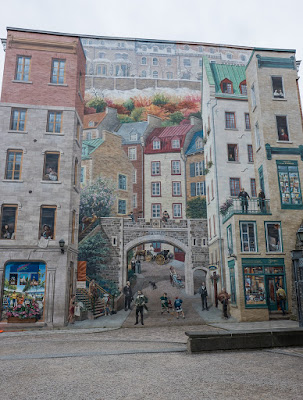Coffee, Carmo and Natas
A good night’s sleep and a tasty breakfast will always put
things into perspective.
This morning we went off in search of another Starbucks
because it’s fun to add them to our long list of coffee shops. They may not
have any local character, but when you are completely new to a place, they’re not
a bad place to stop and get your bearings.
The streets were already mobbed this morning with tourists.
Our taxi driver told us that it was almost impossible to spot a local in this
neighborhood, so as we drove along yesterday the three of us played a game, calling
locals vs. visitors. He was correct, it was hard. Probably less than 1 in 10.
This morning was no different, and I’ll admit it’s kind of weird wandering
around in what is essentially a travel theme park. Even if I’m part of the
problem. Some of the restaurants were open on Rua Augusta, serving croissant
and coffee. I was using Google Maps to find the coffee shop and we climbed up a
bit to the Baixa-Chiado Metro station before stopping to figure out where we
were. Standing in front of a tea shop that Maps had offered, Starbuck should
have been right in front us, but we were standing in front of 3-stories of apartments
facing the street. Walking one way to some stairs, we looked up. Just another
street. Walking the other, more apartment doors and a parking garage. Starbucks
seemed to be hovering in the sky above us, but it wasn’t there. I did notice
some long black banners that said “shopping center” but there was no obvious
way inside. Until we started looking at the apartment doors and found one that
led into a small lobby with a cross-section of the giant mall that was over our
heads. Along with a couple of very modern elevators. Up to the 6th
floor and some coffee.
In the past I’ve relied on paper maps to navigate, rarely resorting
to my phone. Not only do I enjoy the old way, but often your ability to grasp
how things really are is enhanced. On this trip I’ve been using my phone, and
today is a prime example of how technology can fail you. Faint building
outlines, no context and no detail – only by walking back a forth a half-dozen
times did we figure out where we were going.
While sitting and planning, MLW noticed our proximity to the
Igreja do Carmo, the ruins of an ancient church. I had read about it before we
left and decided that it probably wasn’t worth our time, as it’s in a part of
town that doesn’t have a lot of other things to see. And of course, we do need
to manage our time, so I hadn’t added it to the list. But here we were, just
2-blocks away so why not? Before heading there though, we had another quick
stop to make.
Every apartment we’ve had so far has been equipped with a
Nespresso machine and every city has had a Nespresso Boutique where you can
order pods. Lisbon was no different, and its boutique was reportedly just outside
the mall and up the street. So, we exited on the opposite side of the building
and rather than up the street, the Boutique was right there, 20 paces away. I
had a great time with the young lady manning the ordering computer and she even
gave me a cup of Cosi, a variety not yet available in the US.
Leaving and turning right, we found the street to Carmo and
turned again. Two blocks, right? Well, those 2-blocks were straight up hill. A
commonality that every 2-blocks in Lisbon seem to share. Up we went, cresting
in a little park with the church on the right. We paid and went in.
Founded in 1389 by Dom Nuno Álvares Pereira, the church was
known as the stellar example of Gothic churches in Lisbon. Dom Nuno was a notable
general in the armies of King John I who defeated the Castilians in their
attempt to take over Portugal. After a long and illustrious life in politics
and the military, he became a Carmelite friar following the death of his wife. He
was canonized in 2009 as São Nuno
de Santa Maria. His feast day is 6-November.
The church was severely damaged in the Great Earthquake of 1755 (as was
most of the city) with restoration started a year later only to stop in 1834 when
religious orders were banned in Portugal. It stood empty and idle until 1864
when the Carmo Archeological Musuem was installed. Housing bits and pieces of
old buildings and artifacts from digs collected by the Association of Portugese
Archeologists, this museum was one of those instances where it’s a good thing
to throw away the agenda and take a chance.
The collection spans more than 6000 years of history. Under the open
sky in the ruined nave, stone obects are neatly presented and described along
both walls. Roman steles, ancient Jewish gravestones, tons of pieces and parts
from royal family manors – crests, plaques and the like. There is a tidy little
indoor museum located in the original apse of the church. To the right –
Neolithic, Chalcolithic and Bronze Age artifacts are displayed. In the center,
Christian stone work and to the left, pieces from the Islamic Era and the Age
of Discovery included two sad little Incan mummies collected in 16th century
Peru. On the whole, the place was superbly curated with concise labels and descriptions
and honestly, much more than one might expect from such a modest facility.
Time to head back down the hill and after a false start onto a dead end
viewing platform we found a way out of the maze. Hovering to our left, the
famous Elevador de Santa Justa, an ironwork elevator built between 1898 and 1901
to ferry people up from the Baixa district. Still working today, it struck me as
a big rectangular Eiffel Town stuck in a neighborhood.
Our dominating goal for the day was locating a kiosk that sold the New
York times and we found one, back on Rua Augusta. Next a stop for a sandwich to
go, and another stop so we could try Natas, this country’s national
desert. Essentially flan in a crust, we found a traditional place and bought
one plain and one topped with apples.
It was just a few more meters around the block and back to our place. Day
One, Part One complete.





















Comments